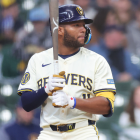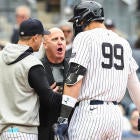
The Texas Rangers are one victory away from winning it all for the first time in the annals of the franchise. That's the reality that confronts them -- or perhaps motivates them -- as they try to eke out one more win in the 2023 World Series against the Arizona Diamondbacks: that they've never taken the final step of winning the World Series in all their years.
The Rangers are one of six franchises in Major League Baseball that have never hoisted the trophy. Their fellow travelers in misfortune are the Mariners, Padres, Rays, Rockies, and Brewers. The Rangers, though, are the oldest of these franchises, as their origins trace back to 1961, when the second version of the Washington Senators was birthed. They moved to Arlington prior to the 1972 season and became the Rangers. While Cleveland, which hasn't won the World Series since 1948, has the longest title-less drought of all, the Rangers have the "distinction" of being the oldest franchise to never, ever win it all.
Their matchup with the D-backs in the World Series of course presents an opportunity to change that, but it's worth recalling that Texas has had such opportunities before -- tantalizingly close opportunities. This, after all, is their third pennant, which of course means that their World Series efforts of those prior two pennant-winning campaigns came to grief. At this point, it merits revisiting the Rangers' history of failing to achieve that greater goal, which should reinforce just how much this latest trip to the Fall Classic means to the franchise.
The early and fruitless years
During their 11 seasons in D.C., the Senators/Rangers endured 10 losing campaigns and in their lone winning season finished in fourth place. After becoming the Rangers and moving to Arlington, they clocked 205 combined losses in their first two seasons and earned a book-length chronicling of their failures.
Their first winning season in Texas came in 1974 under Billy Martin, but their 84 wins were good for no more than a second-place finish in the American League West. Better results but a similar bottom line awaited them in 1977. The Rangers won a then-franchise-record 94 games that year and most curiously did so under four different managers. The first, Frank Lucchesi, was let go after a middling 31-31 start, but his footing became less secure after a one-sided spring-training brawl with one of his players, Lenny Randle (Lucchesi wound up in the hospital). He was replaced in the dugout by Eddie Stanky, who abruptly retired after only one game in charge (a 10-8 win over the Twins). Next was interim Connie Ryan, who lasted all of six games at the helm. Finally, owner Brad Corbett landed on Orioles bench coach Billy Hunter for his fourth manager in the span of a week. Hunter got the desired results, as Texas went 60-33 under him. However, their 94-68 record was outdone in the AL West by the 102-win Royals, and the Rangers missed the postseason.
As for Hunter, he guided the Rangers to another winning effort in 1978 but was let go with one game remaining in the regular season.
The absurdity of 1994
The Rangers continued to wallow in irrelevance and by the early 1990s they had existed, first as the Senators and then as the Rangers, for more than 30 years without fetching a single playoff berth. As of the conclusion of the 1993 season, the Rangers had notched four winnings seasons within the previous five years, but a division title eluded them each time. Helmed by established talents like Rafael Palmeiro, Kevin Brown, Kenny Rogers, and late-career Nolan Ryan, in addition to rising young stars like Ivan Rodriguez and Juan Gonzalez, the Rangers were a respectable presence in those years but not quite good enough. In 1994, however, things got better, even as they got worse.
That season was to be the first time MLB played with six divisions instead of four. The addition of the Rockies and Marlins to the National League rolls via expansion in 1992 meant 14 teams in each league, and that prompted playoff expansion via added divisions and a pair of wild-card berths. Because the number 14, or the teams in each league, was not – and still is not – perfectly divisible by three, the number of divisions in each league, one loop wound up with just four teams. In the AL, that was the West, home of the Rangers, A's, Mariners, and Angels.
The 1994 season was of course snuffed out far in advance of completion because of a labor stoppage. That brings us to the "final" AL West standings for that season:
| Team | W | L | W-L% | GB |
|---|---|---|---|---|
Texas Rangers | 52 | 62 | .456 | -- |
Oakland A's | 51 | 63 | .447 | 1.0 |
Seattle Mariners | 49 | 63 | .438 | 2.0 |
California Angels | 47 | 68 | .409 | 5.5 |
Yes, the Rangers were both 10 games below .500 at close of play on Aug. 10, which turned out to be the final day of the 1994 season, and in first place. Stated another way, the Rangers well past the halfway mark were on pace to go 74-88 yet win their first ever division title. As we know, especially in the era of expanded playoffs, the goal is to get in, and from that point any and all comers are liable to win it all. The '94 Rangers were unable to test the oceanic depths of this principle. While they may have frittered away that division lead had the season been fully realized and had they won it may not have fared well in the postseason against demonstrably superior teams, we can't say that for certain. Maybe they would've stumbled out of an open second-floor window and into a passing dump truck that would've ferried them to a World Series title.
Playoff breakthroughs (and playoff losses)
The surrealities of 1994 may have concealed what was coming for Texas, and what was coming was the club's most sustained run of relevance and near-excellence yet. Under the guidance of general manager Doug Melvin and field manager Johnny Oates, the Rangers at last found their long-sought level. Buoyed by homegrown products Rodriguez, the catcher and future Hall of Famer; Gonzalez, one of the leading sluggers of his era; and the chronically underrated Rusty Greer and complemented by veteran additions, the lineup was an imposing one for those years. While the Rangers were forever pining for pitching depth, veteran starters like Rick Helling and Aaron Sele helped stabilize a rotation saddled with pitching half their games in the hitter's haven that was the Ballpark in Arlington.
The franchise's first division title came in 1996, but in the ALDS they were bounced in four games by the emerging Yankee dynasty. Texas backslid to 85 losses in '97, but they recouped to again win the AL West in 1998 and again in '99 with a 95-win campaign. Again, though, the colossus in the Bronx made their postseason stays brief ones as they swept the Rangers in the ALDS in both '98 and '99. The Rangers' run of contention ended with a 1-9 record in playoff games.
Soon after, hedge-funder Tom Hicks bought the team and spent lavishly to sign Alex Rodriguez to what was the largest contract in MLB history at that time. While A-Rod more than lived up to expectations in Texas, the club failed to surround him with worthy complementary talents. The Rangers re-entered the competitive desert for a few years.
The bounceback and first pennant
Jon Daniels at the age of 28 replaced John Hart as the club's lead decision-maker in 2005 and better results followed. Following some most steady improvement in the standings and reconstruction of the young talent base, the Rangers stepped forward in 2010. Home-reared talents like Ian Kinsler, Elvis Andrus, Nelson Cruz, C.J. Wilson in tandem with outside additions like famed reclamation project Josh Hamilton – the AL MVP for 2010 – yielded a division title – and deadline pick-up Cliff Lee.
Under manager Ron Washington, whose frantic mannerisms and occasional "taking the corner on two wheels," once led this scribe to tab him "American's favorite cackling bedlamite," the Rangers also notched their first victory in a postseason series – a 3-2 win over the Rays in the ALDS. In a partial purging of their earlier playoff failures, they also took down the defending-champion Yankees in six games to win the first Rangers pennant ever:
(Yes, that was A-Rod frozen for the clinching final out.) Their ultimate goals went unrealized in the World Series, as they fell to their current manager Bruce Bochy, who was in the midst of leading the Giants to three rings. San Francisco dispatched the Rangers in five games.
Game 6, 2011 World Series
Nothing causes the righteous gnashing of teeth among Rangers partisans like invoking one of the greatest games ever played.
The 2011 Rangers barged back to a second-straight World Series on the strength of a franchise-record 96 wins in the regular season. They bounced the Rays in four games in the Division Series and then topped the Tigers in six games in the ALCS. Their World Series match-up with the Cardinals occasioned some memorable moments before we even got to that unforgettable Game 6. St. Louis took Game 1, but the Rangers mounted a ninth-inning comeback in Game 2 to even the series. Game 3 back in Arlington saw Albert Pujols crack three home runs and give the series lead back to the Cardinals. Texas struck back in Game 4 with 8 1/3 scoreless innings from Derek Holland.
The leading sub-plot of Game 5 was Cardinals manager Tony La Russa and his difficulties communicating via the bullpen phone. As a consequence, closer Jason Motte was unavailable because bullpen coach Derek Lilliquist not once but twice misheard La Russa's instructions to warm him up alongside left-hander Marc Rzepczynski. That forced Rzepczynski to face lefty killer Mike Napoli, who hit a go-ahead double in the eighth inning that provided the eventual margin of victory. It was all mere prelude.
With the Rangers up 3-2 and the series back in St. Louis, Game 6 was a wild one from the jump. The lead changed hands six times in the first six innings, but the Rangers pulled ahead 7-4 in the seventh thanks in part to back-to-back home runs from Adrián Beltré and Nelson Cruz. The Cardinals added a run in the eighth on an Allen Craig homer but still trailed 7-5 going into the bottom of the ninth.
For the Rangers, closer and reigning AL Rookie of the Year Neftalí Feliz was tasked with getting the final three outs and securing the first World Series title in the annals of the Texas Rangers. Feliz struck out Ryan Theriot for the first out. Then, however, Pujols doubled and Lance Berkman walked. Felix rebounded to get a called strike three on Craig. That brought St. Louis native son David Freese to the plate. Feliz worked to a 1-2 count, which put the Rangers a strike away from the title. Then thunder struck:
The Freese triple, perhaps abetted out in right field by Cruz who was going back on the ball in an unfamiliar park, tied the game at 7-7. Feliz rallied to get Yadier Molina on a lineout – to Cruz in right field – and strand Freese at third. In the road half of the 10th, the Rangers again claimed a two-run lead on Josh Hamilton home run off Motte.
Veteran lefty Darren Oliver took the mound for the Rangers in the bottom of the 10th staked to a 9-7 lead. He yielded back-to-back singles to bring the potential winning run – or losing run, from the Texas standpoint – to the plate. All but out of options, La Russa sent up a starting pitcher, Kyle Lohse, as a pinch-hitter. Lohse bunted the runners over, and Washington summoned Scott Feldman into the breach. He permitted an RBI groundout to make it 9-8. An intentional walk of Pujols followed, which brought Lance Berkman to the dish. Feldman ran the count to 2-2, which for the second time in as many innings put the Rangers within one strike of winning the World Series. And then:
The single by Berkman plated Jon Jay with the tying run and once again the Rangers had squandered a clinching opportunity. Feldman escaped further damage, and Texas stranded a runner in the 11th and failed to score. In the bottom of the 11th, Washington double-switched right-hander Mark Lowe into the game to face Freese. With a full count, Freese doubled up on his hero's standing and ensured there would be a Game 7 the next night:
That 420-foot clout to center not only earned Freese some celebratory ritual abuse at home plate, but also made him just the fourth player ever to end a postseason elimination game with an extra-innings walk-off home run.
As chronicled, the Rangers were on two occasions one strike away from winning the 2011 World Series, and basic win expectancy paints a perhaps even more lacerating picture for Texas. Their chances of winning Game 6 were north of 90% from the bottom of the seventh through the top of the eighth. It dipped below that mark in the bottom of the eighth on Craig's homer off Holland but topped 90 again when Rafael Furcal's groundout ended the frame. After Feliz struck out Theriot to open the bottom of the ninth, the Rangers' chances of victory peaked at 96%. They would crater upon Freese's triple only to top 90 again when Texas restored their two-run lead in the 10th. Leading up to Berkman's clutch single in the bottom of the 10th, those odds rose again to almost 90. That Berkman liner, though, dumped Texas's hopes in a trough until Freese zeroed them out in the 11th.
The succession of miracles gave Game 7 the whiff of the inevitable, even after the Rangers barged to a 2-0 lead in the first. That lead would last all of 20 minutes or so until, yes, Freese in the home half of the opening inning doubled home the tying runs off Matt Harrison. By the end of the seventh, the Cardinals had measured out a four-run lead that would not be compromised. When Motte teased a fly ball out of David Murphy for the final out, it marked the last time a Texas Ranger had been on the field during the World Series.
Until Friday, that is.
And now for the now
The Rangers returned to the playoffs in 2012, but their stay was brief. A brief pivot followed, and by 2015 they were back in the postseason, this time under manager Jeff Banister, and again departed early. The 2016 season saw Texas amass 95 wins thanks to a core that still included Beltré – probably the greatest free-agent signing in Rangers history – and Andrus in addition to names like Cole Hamels, Yu Darvish, Rougned Odor, and Robinson Chirinos. Still and yet, they were once again bounded in the opening round, this time by the Blue Jays in an ALDS sweep.
At that point, organizational decline began. Banister was let go and replaced on a permanent basis by Chris Woodward. The Rangers added pieces in the intervening years, but on-field success eluded them. In 2021 they sustained their first 100-loss campaign since the year after they relocated to Arlington. A heightened commitment from ownership permitted Daniels to add the likes of Corey Seager and Marcus Semien, both of whom have been essential to the current squad's success. The 2022 season, however, was barely better than 2021, and by August Daniels was let go after almost 17 years as the club's top operator. While current GM Chris Young is responsible for the team's rebuilt rotation, the lineup is where you find Daniels' lasting influence. Of the Rangers' current lineup regulars, only DH Mitch Garver wasn't signed, traded for, or drafted under Daniels.
With that array of fingerprints all across the roster and the weight of franchise history upon them, they move forward to face Arizona and try again to do what they've never done before.






















